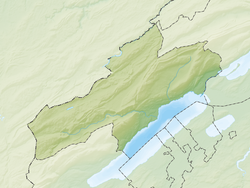Milvignes
| Milvignes | ||
|---|---|---|
|
||
| Coordinates: 46°58′N 6°52′E / 46.967°N 6.867°ECoordinates: 46°58′N 6°52′E / 46.967°N 6.867°E | ||
| Country | Switzerland | |
| Canton | Neuchâtel | |
| District | Boudry | |
| Area | ||
| • Total | 8.78 km2 (3.39 sq mi) | |
| Elevation | 457 m (1,499 ft) | |
| Population (Dec 2015) | ||
| • Total | 9,069 | |
| • Density | 1,000/km2 (2,700/sq mi) | |
| Postal code | 2012 - 2014 | |
| SFOS number | 6416 | |
| Localities | Auvernier, Bôle and Colombier | |
| Surrounded by | Rochefort, Corcelles-Cormondrèche, Peseux, Neuchâtel, Boudry | |
| Website |
http://www.milvignes.ch SFSO statistics |
|
Milvignes is a municipality in the district of Boudry in the canton of Neuchâtel in Switzerland. It was formed on January 1, 2013 by merging the former municipalities Auvernier, Bôle and Colombier.
Auvernier is first mentioned in 1011 as Averniacum. The municipality was formerly known by its German name Avernach, however, that name is no longer used.
Bôle is first mentioned in 1346 as Boule.
Colombier is first mentioned in 1228 as Columbier.
Four lakeside settlements from the neolithic and the Bronze Age have been discovered in Colombier. One of the largest Roman era villas in Switzerland was excavated from under the castle in 1840–42 by Frédéric Dubois de Montperreux. It was built in multiple stages between the 1st and 3rd centuries AD into a palatial mansion with a peristyle, at least two baths with mosaics and frescoes and terraced gardens. A Merovingian graveyard was found near Colombier.
In the 11th or 12th century a fortified tower was built over the ruins of the Roman villa. It expanded in the 13th Century and by the 16th century had reached its present appearance.
During the Middle Ages, the Seigneurie of Colombier included the villages of Colombier and Areuse, a part of Bôle and a third of the Vogtei of Bevaix. They also had rights in Fretereules and Val-de-Ruz. The noble Colombier family were vassals of the count of Neuchâtel. During the Middle Ages, they also acquired, by marriage, the fiefs of Savagnier, Cormondrèche and the fief of the Pressoir of Colombeir in Thielle. In 1488 the Colombier lands were acquired by marriage by the de Chauvirey family of Franche-Comte. In 1513, they were acquired by Johann Jakob von Watteville of Bern. Under von Watteville, the territory expanded further into Bevaix. In 1564, the land was purchased by the Counts of Neuchâtel, for 60,000 crowns. Under Johann Jakob von Watteville, the Protestant Reformation was successfully introduced in town. When portions of the Armée de l'Est were interred in Colombier in 1871, the Catholic Mass began to be read once again in the church.
...
Wikipedia




